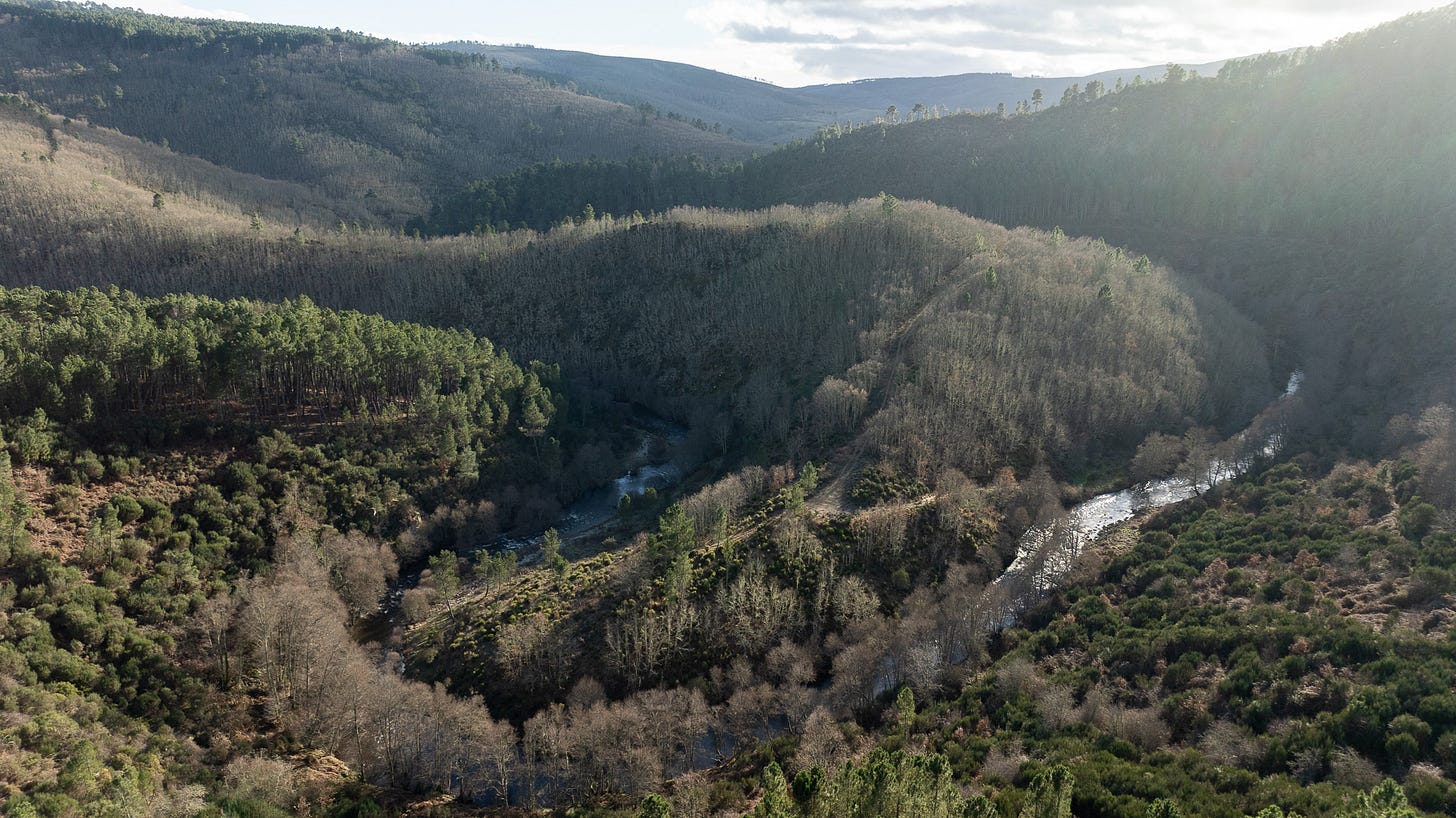Running to Nowhere
Reflections from the trail: thoughts on culture, competition and a different relation to the landscape.
"When is your next competition?" I'm asked inquisitively by one of guys clearing the trail for the running race on Sunday.
"There is no competition, I am running to run and for nothing else." I respond.
He looked at me and for a moment was a little perplexed, followed by a moment of clarity.
It was as if my answer had released some unconscious belief or assumption from his psyche. He smiled and understood. I wished him luck with the bush clearing and continued up the mountain, my legs brushing against the overgrown rockrose, my lungs filling with the sweet scent.
These days I am not the only one up in the Serra. This spring has been exceptionally wet but the schist mountains are thrumming with life. Purple heather covers the rocky slopes, bursting with vibrant hues that are contrasted with the intense yellow of broom blossom.
An old farmer climbs slowly up the track, appearing over the crest of the hill as if it were a mirage — fully kitted out with his flat cap, tweed coat and a grey-black plume of unburnt fuel that spews out of his vintage motorbike. Rural Portugal at it’s finest.
The land is awakening again after hibernation and so too are the humans, although this brings other qualities that are not so pleasant. Trail running races mean discarded energy gel wrappers left scattered across the land. On Sundays, outsiders come with off-road vehicles — buggies, quads and dirt bikes — destroying the serenity with obnoxious exhaust noise and clouds of dust. These days, I am more often reminded of what I am trying to get away from.
Who am I to complain? I’m not even from here. I’m fully aware that the mountains are not solely mine to be enjoyed. Yet, it has been an interesting point of reflection when I see how we interact with these places and why, and what we leave in our wake.
The local workers from the municipality are out preparing the dirt roads for the rally race next weekend. Those rolling hills blanketed with dark magenta of which I have become so fond of in recent days — holding nostalgic value, providing gentle reminders of late summer in west Cornwall or the Cairngorms — have now been reduced to nothing but dust and splinters.
The sweet smell of blossom has, for the time being at least been replaced by the pungent stench of two-stroke gasoline from a small cohort of strimmers. The contrast of before and after is depressing, to say the least.
The dirt tracks are currently being repaved by heavy industrial machinery and the valleys are reverberating with low-pitched grumbling noises from giant diesel engines. I suppose it serves as a reminder of who or what is really “in charge” — the corporate interests, the sponsors, the government which is constantly seeking to take advantage of what little wildness remains.
For the past weeks I’ve been trying to put together the right words to describe this feeling, to find the common thread in these experiences which seem to be connected somehow.
It is a strange juxtaposition, the euphoric highs of feeling at one with the landscape and the bubble-bursting moment when it seems as if there is no escape from industrial modernity, that ominous feeling that the machine may well consume everything in its wake until nothing living remains. You can move off-grid but that doesn’t stop “the grid” from catching up with you.
It’s made me ponder on the way we exist and interact with the landscape, and how it is indicative of our own conditioning.
We live in a culture where our need to take, to dominate, to extract from a place or its people for maximum profit seems to be the ultimate aim. And this aim can only take priority if we live in a constant state of lack, fearing that who we are and what we have is not enough, leading to further extraction and consequently, destruction.
I’ve felt estranged as an athlete in the outdoors scene since I began cycling almost ten years ago. One only needs to look at the sponsors behind professional sport to grasp how it functions. There is so much emphasis on competition, on proving oneself, on striving for “goals” without any clear, deeper intent. Much like our economic model. But this was never the driving force for my own athletic practice. It just took a while to be able to put it into words.
The need for constant numerical improvement, although useful at times, seems to take precedent over the actual experience itself: the privilege to move and be in these places is for some reason not enough. Which of course speaks to an even deeper layer of our human conditioning.
More than winning, more than driving profit margins, more than pushing forward “no matter what”, the real question we should be asking ourselves is: what is enough? If we placed more emphasis on sufficiency instead of efficiency, on creating true meaning and connection instead of bulldozing and dominating for arbitrary reasons, perhaps there would be no need for all of this.
Perhaps that morning run in the mountains would be enough.
To feel held by the landscape, nourished by fresh air and hydrated by spring water, to appreciate the warmth of the sun on your shoulders and to hear the birdsong return once again.



It makes me so happy to read this. I've never been one for competition, and have felt that we should live life to fulfill ourselves, not to compete against one another. It's refreshing to read this viewpoint.